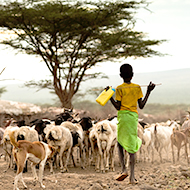
Award will help researchers eradicate the disease across the world
The Royal Veterinary College (RVC) has won a Global Challenges Research Fund (GCRF) award to fund its research into peste-des-petits (PPR) ruminants or ‘goat plague’.
The College, together with African, British, and European researchers, will use the award to help eradicate this deadly disease, by validating tests which can identify its presence in animals.
PPR is a highly contagious, often fatal disease that poses a threat to sheep and goats. Prevalent across Asia and Africa, animals with the condition display symptoms of fever, diarrhoea, coughing, discharge from the eyes and nose.
Thanks to funding from the GCRF, a team led by Professor Richard Kock, Dr Bryony Jones and Dr Camilla Enfield have been studying PPR for the last seven years. Their research has concentrated on untypical hosts for the virus, given its spread into new habitats and amongst novel species, to help develop strategies that will efficiently eradicate the virus.
The GCRF award will allow the RVC to examine various new tests that have been developed for PPR serology. In particular, the team will employ novel methods to investigate if pseudotype tests and luminescence assays can be used to test for PPR, and better validate test protocols ready to support global vaccination programmes.
The scientists will also work to confirm if the tests work across a diverse variety of untypical hosts. The only commercial test currently available is ELISA, and there are concerns surrounding the false positive and negative results it has had in some species.
Professor Richard Kock, a specialist in wildlife health and emerging diseases at the RVC, said: “PPR is a global challenge, not only of great economic concern to poorer livestock keepers across Asia and Africa but also, it kills rare and vulnerable wildlife, disturbing ecosystems. This situation justifies action, especially in the current global climate, where poverty and insecurity of human populations is leading to mass migration and conflict, further spreading diseases, creating hunger and loss of resilience.
“It is likely there will only be one shot at eradicating this menace affecting many species, so it is vital that the tools are in place and accurate. This contribution led by the Royal Veterinary College in partnership with, British, European and African researchers will be significant in this regard.”



 The Veterinary Medicines Directorate (VMD) is inviting applications from veterinary students to attend a one-week extramural studies (EMS) placement in July 2026.
The Veterinary Medicines Directorate (VMD) is inviting applications from veterinary students to attend a one-week extramural studies (EMS) placement in July 2026.